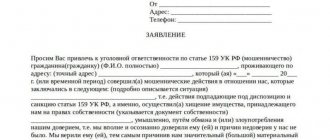There are many reasons why a citizen might contact the police. As a rule, police are contacted when you need to protect your rights, punish criminals, or protect yourself from a possible crime.
But sometimes it happens that you need to turn to the police for help, because their employees have powers and resources that are not available to everyone. In this article we will talk about what a statement about the search for a person to the police is, how it is written and how to find a person with its help.
Multi-channel free hotline Legal advice on criminal law. Every day from 9.00 to 21.00
Moscow and region: +7 (495) 662-44-36
St. Petersburg: +7 (812) 449-43-40
When can I serve?
First, let's look at situations in which a person can be considered missing. In fact, there is no clear time limit, and a person can be declared missing at any time - even if he simply did not show up at the appointed time. But there is one nuance here - if you want to declare someone missing, then you need to at least try to find the person - call available numbers, contact his friends, contact his place of residence, etc. That is, if you come to the police and say that you didn’t even look for the missing person, then this will not be of much use, since the police will spend a lot of time on what you could do in a very short time on your own.
Let's talk about timing. There is a popular belief that in order to contact the police, you need to wait three days from the moment a person goes missing. This is not true, and such a myth arose due to the fact that many citizens violate the very rules of filing a missing persons report with the police. In fact, there is no need to wait, and as soon as you are unable to find the missing person on your own, you can contact the police. So it doesn’t matter who is missing - a child, a healthy adult or a pensioner, you have the right to look for him immediately, and refusal to accept the application will be regarded as a gross violation.
The last thing to consider is the timing of the application itself. There is also one peculiarity here - if most applications to the police can be considered for some time and there is a deadline for their analysis, then a missing person application should be considered instantly. That is, your application must be transferred directly from the reception to an authorized employee, who will be obliged to immediately take any active action depending on the situation.
The procedure for detaining an accused person who is wanted
Permission by the legislator to detain a wanted accused in the manner prescribed by Chapter 12 of the Code of Criminal Procedure of the Russian Federation makes it possible to turn to the technology of detaining a suspect. For this purpose, by analogy with the procedure for detaining a suspect, it is necessary to highlight the structural elements that form the procedure for detaining the accused:
1) issuing a decision to detain the accused;
2) discovery of the accused;
3) capture and delivery of a wanted accused to an office premises;
4) notification of the initiator of the search about the discovery and verification of the grounds for the detention of the accused;
5) drawing up a protocol;
6) search and (or) personal search of the detainee;
7) interrogation of the accused;
9) notification of family (relatives) of detention;
10) end of detention.
Next, it is advisable to concentrate attention on the analysis of the features of the procedural form of the coercive measure under consideration. By the time the accused is put on the wanted list, the investigator has time at his disposal to make a deliberate and balanced decision to detain the accused, which is formalized by a decree. It should be taken into account that the resolution is sent with an order in accordance with paragraph 4 of Part 2 of Art. 38 of the Code of Criminal Procedure of the Russian Federation, which, in addition to detention, should provide for investigative actions with the participation of the accused (personal search, interrogation of the accused). It should be recognized as unlawful practice when a decision is not issued, but the drawing up of an order for detention is limited.
Until recently, the moment of direct restriction of freedom (capture and delivery) of a wanted accused was not regulated by law. This gap has been eliminated thanks to the Law on Police. We must turn to clause 13, part 1, art. 13, according to which the police have the right to deliver citizens, that is, to forcibly transport them to an office premises in order to establish the identity of a citizen if there is reason to believe that he is wanted as a fugitive from the bodies of inquiry, investigation or court.
The fact of delivery to the official premises is documented in a protocol drawn up in the manner established by parts 14 and 15 of Article 14 of the Law “On the Police”. Further actions with the wanted accused will depend on the location of his discovery. If the accused is found at the place of investigation, no special difficulties associated with the detention procedure arise. The accused is taken to the duty station, about which the investigator in charge of the criminal case is notified, who, in turn, draws up a detention report.
Difficulties arise when the accused is found at a location other than the place of investigation. The investigation of the wanted accused in accordance with departmental orders should be carried out by the operational duty officer and the duty shift staff. At the same time, it is advisable to entrust the consideration of the issue of further detention of the accused to the investigator. This is justified based on the following considerations. Firstly, the investigator will more carefully consider the issue of the need to implement the detention order, since he has experience in making such decisions. Secondly, he will subsequently have to support the petition for arrest in court. The verification carried out upon discovery of the accused consists of performing a set of actions: it is necessary to notify the initiator of the search, evaluate the results of identifying the accused based on available information, check him against records, and obtain explanations from him.
When considering the issue of subjects entitled to make a decision on detention, it is necessary to refer to the Law “On the Police”. In accordance with clause 4, part 2, art. 14 of the law, police officers have the right to detain wanted persons until they are transferred to the relevant bodies, institutions or officials of these bodies and institutions. If, in the case of the detention of a suspect, the Law “On Police” states that it is carried out on the grounds, in the manner and for the period provided for by the criminal procedural legislation of the Russian Federation (Clause 1, Part 1, Article 14), regarding the detention of a wanted person, such legislative procedure has not been applied. And this, we believe, is not accidental. In this regard, the interesting question is whether the detention made by the police and the detention provided for in Part 3 of Art. 210 of the Code of Criminal Procedure of the Russian Federation with different types of restriction of freedom of movement or different stages of the same coercive measure.
Detention is not a one-time act, but a complex of legal relations, the implementation of which is conditioned by the creation of the necessary guarantees aimed at ensuring its legality. Analysis of Art. 14 of the Law “On Police” suggests that the procedure for detaining a person is incomplete; it regulates the initial actions to restrict freedom of movement. In particular, the interrogation of the detainee and the message to the prosecutor are not indicated; in turn, these procedural actions are provided for by Chapter 12 of the Code of Criminal Procedure of the Russian Federation.
In addition, it should be taken into account that the detention of a wanted person, in accordance with paragraph 4 of Part 2 of Art. 14 of the Law “On Police”, lasts until it is transferred to the relevant bodies, institutions or officials of these bodies and institutions. However, after the accused has been delivered, for example, to the investigator, there remains a need to resolve the issue of a preventive measure in the form of detention in relation to the wanted person. Accordingly, until a court order is received to arrest the accused, his continued detention is required. Thus, police detention is aimed at delivering the detected person to a law enforcement agency, further restriction of his freedom of movement is carried out in the manner prescribed by Part 3 of Art. 210 Code of Criminal Procedure of the Russian Federation.
When considering this stage of detention, it is important to decide on the authority to which the police officer transfers the wanted person. If the accused is found at the place of investigation, no difficulties arise in resolving this issue. The police officer delivers him to the duty station or directly to the investigator (interrogating officer) and draws up a detention report, which reflects the circumstances of the discovery of the wanted person.
However, what to do if the accused is found in a region remote from the place of investigation, when it takes a long time (exceeding 48 hours) to deliver him? The question arises whether in this case it is legal to bring him into police custody. We believe the answer to this question should be negative. In paragraph 4 of Art. 14 of the Law “On Police” does not indicate the period for which a person can be detained; it is indicated that detention can last until the suspect (accused) is transferred to the relevant authorities or institutions. However, the total period of detention, according to Art. 22 of the Constitution of the Russian Federation, cannot exceed 48 hours. In addition, as noted earlier, after the wanted accused has been transferred to the investigator, there remains a need to further detain him in order to resolve the issue of a preventive measure in the form of detention.
Thus, the relevant body, institution, until transfer of which the accused is detained, if he is found in a region remote from the place of investigation, should be understood as the nearest law enforcement agency, the official of which is authorized to decide the issue of further restriction of a person’s freedom, in accordance with the criminal procedural legislation .
The foregoing allows us to assume that the detention of a wanted accused is carried out in several stages, the allocation of which is determined by the nature of the activities of law enforcement agencies carrying out criminal proceedings. Police officers have certain powers in this area and, in cases provided for by law, assist the investigator. Police officers carry out a search and, accordingly, must have procedural powers, which are so important in locating the wanted accused.
The detention of a wanted person is a technological process consisting of several stages, depending on the situation, implemented by the relevant entities. Ideally, the investigator carries out the entire arrest process on his own. The right of police officers to detain arises only in cases precluding its exercise by the investigator. This is a forced rapid response measure, implemented in situations where the need for detention arises suddenly. The circumstances characterizing the moment of discovery of the accused make it possible to justify the right of police officers to detain a wanted person in the absence of an investigator’s order. However, further restriction of the freedom of the accused in the manner provided for in Part 3 of Art. 210 of the Code of Criminal Procedure of the Russian Federation can be carried out exclusively by the relevant subject (the investigator in charge of the criminal case or another official on the basis of his decision).
In case of detention in accordance with the Law “On Police”, and then in accordance with Part 3 of Art. 210 of the Code of Criminal Procedure of the Russian Federation, two detention protocols are drawn up, the first of which is drawn up in accordance with Part. 14, 15 art. 14 of the Law “On Police”. The second is drawn up after the transfer of the accused to the investigator in accordance with Art. 92 of the Code of Criminal Procedure of the Russian Federation. The protocol is drawn up in four copies. The original remains in the criminal case. Copies must be handed to the accused and his defense attorney and sent to the temporary detention facility.
It should be recognized as unlawful cases encountered in law enforcement practice when the investigator initiating a search sends a detention protocol filled out on his behalf to the place where the accused was found. The officer who discovered the accused can only enter the time of arrest. A point of view has been expressed that the protocol should be drawn up not by the employee of the investigative body executing the decision, but by the investigator who issued it[11]. Drawing up a protocol of arrest in absentia in the absence of the accused is unacceptable. If such situations arise, a detention order should be issued, and the person implementing it, on his own behalf, draws up a protocol, on the basis of which the administration of the temporary detention facility places the detainee in a detention cell (Article 5 of the Federal Law of July 15, 1995 “On the detention of suspects and accused of committing crimes")[12].
In conclusion, it should be noted that the introduction of the detention of the accused into the system of coercive measures does not solve all the problems that arise when the wanted person is detected. Further improvement of criminal procedural legislation in this part is seen in a detailed regulation of the detention of the accused and a softening of the ban on arrest in absentia.
Conclusion
Ensuring the participation of the suspect (accused) in criminal proceedings is one of the tasks facing the preliminary investigation authorities. In solving this problem, the investigator is obliged to create a regime that excludes the possibility for the accused to escape from the investigative authorities (choose an adequate preventive measure; throughout the investigation, study the identity of the accused in order to promptly prevent the possibility of his evasion; carry out a set of preventive measures to prevent evasion from the investigative authorities ). If, nevertheless, the measures taken did not produce the desired result and the accused disappeared, the investigator, using the means available in his arsenal, is obliged to search for the accused both personally and with the help of the investigative bodies.
Unfortunately, in law enforcement practice it turns out that the investigator withdraws himself from carrying out investigative activities. This state of affairs is explained by many reasons. In particular, there is an opinion that the search is not the responsibility of the investigator; in addition, the Code of Criminal Procedure of the Russian Federation does not have clear regulation of the procedure and means of search. At the same time, a systematic interpretation of the norms of the Code of Criminal Procedure of the Russian Federation allows not only not to doubt such an obligation of the investigator, but also to decide on a system of means of establishing the whereabouts of a hiding suspect (accused).
Currently, there is an acute problem of restricting the freedom of movement of an accused person found at a location other than the place of investigation. The recommendations proposed in the lecture make it possible, turning to such a measure of coercion as the detention of the accused, to resolve the issue of a preventive measure in the form of detention.
| LIST OF REFERENCES USED |
| main sources |
| 1. Criminal Procedure the Russian Federation of December 18, 2001 No. 174 - Federal Law (as amended on December 7) // SZ RF. – 2001. – No. 52 (part 1). – St. 4921. |
| 2. Determination of the Constitutional Court of the Russian Federation of March 20, 2007 No. 175-О-О “On the refusal to accept for consideration the complaint of citizen Alexander Nikolaevich Zinoviev about the violation of his constitutional rights by part three of Article 210 of the Criminal Procedure Code of the Russian Federation” // Reference - legal system “ConsultantPlus” (the document was not published). |
| 3. Ruling of the Constitutional Court of the Russian Federation dated September 29, 2011 No. 1306-О-О “On the refusal to accept for consideration the complaint of citizen A.B. Tanaev.” for violation of his constitutional rights by the provisions of Articles 110, 208 and 209 of the Criminal Procedure Code of the Russian Federation" // Reference and legal system "ConsultantPlus" (the document was not published). |
| 4. Resolution of the Plenum of the Supreme Court of the Russian Federation No. 22 of October 29, 2009 “On the practice of using preventive measures by courts in the form of detention, bail and house arrest” // The document was not published. Access from the reference legal system "ConsultantPlus". |
| 5. Resolution of the Plenum of the Supreme Court of the Russian Federation of March 5, 2004 No. 1 “On the application by courts of the norms of the Criminal Procedure Code of the Russian Federation” // Bulletin of the Supreme Court of the Russian Federation. – 2004. – No. 5. |
| 6. Resolution of the Constitutional Court of the Russian Federation dated January 31, 2011 in the case of verifying the constitutionality of a number of provisions of the Criminal Procedure Code of the Russian Federation and the Federal Law “On Insolvency (Bankruptcy)”. // SPS ConsultantPlus |
| 7. Order of the Ministry of Internal Affairs of the Russian Federation of May 5, 1993. No. 213 “On approval of the Instructions on the organization and tactics of investigative work of internal affairs bodies and the Instructions on the organization and tactics of identifying citizens from unidentified corpses, sick people, children who, due to health or age, cannot provide information about themselves” (Amendments and additions - Order of the Ministry of Internal Affairs of the Russian Federation No. 744 of November 13, 1998); |
| 8. Order of the Ministry of Internal Affairs of the Russian Federation No. 786, Ministry of Justice of the Russian Federation No. 310, FSB of the Russian Federation No. 470, FSO of the Russian Federation No. 454, FSKN of the Russian Federation No. 333, FCS of the Russian Federation No. 871 dated October 6, 2006 “On approval of the Instructions for organizing information support for cooperation through Interpol " |
| Additional sources |
| 9. Bogolyubskaya T.V. Activities of an internal affairs investigator to search for escaped accused: a training manual. – M., 1986. –54 p. |
| 10. Bordilovsky E.I., Galustyan O.A. Suspension, renewal, termination of a criminal case and the end of a preliminary investigation with an indictment: a training manual. – M., 2004. – 106 p. |
| 11. Bykov V.M., Lomovsky V.D. Suspension of criminal proceedings. – M., 1978. – 109 p. |
| 12. Gladysheva O.V., Repkin M.S. The concept and legal nature of the investigative actions of the investigator // Russian investigator. – 2009. – No. 1. |
| 13. Zakirov S.G. Grounds and procedural procedure for resuming a preliminary investigation in a suspended criminal case due to the absence of a person to be charged as an accused // Investigator. – 2006. – No. 11. |
| 14. Kamanitsin A.S. Detention of the accused - problems in the formation of a new criminal procedural institution. Problems of jurisprudence: a collection of scientific articles by young scientists of the Faculty of Law / resp. ed. O.A. Zayachkovsky. – Kaliningrad, 2005. |
| 15. Kruglikov A., Dikarev I. On the essence and problems of choosing a preventive measure in the form of detention in the absence of the accused // Criminal Law. – 2006. – No. 1. |
| 16. Panov S., Klyuev S., Malykhin E. Search for persons hiding from the bodies of inquiry, investigation and court // Legality. – 2008. – No. 10. |
| 17. Purs A.G., Zaitseva L.L. Detention of the accused is a new measure of criminal procedural coercion: problems of legislative regulation and application practice // Lawyer practice. – 2006. – No. 5. |
| 18. Sementsov V.A. Investigative actions of the investigator // Russian investigator. – 2004. – No. 12. |
| 19. Chuvilev A.A., Bogolyubskaya T.V. The accused fled... // Sov. police – 1984. – No. 4. |
[1] Federal Law of July 4, 2003 No. 92 - Federal Law supplemented Art. 210 of the Code of Criminal Procedure of the Russian Federation with a new part 3, according to which, if an accused person put on the wanted list is discovered, he can be detained in accordance with Ch. 12 of this Code // Collection of legislation of the Russian Federation. 2003. No. 27. Art. 2706.
[2] Resolution of the Plenum of the Supreme Court of the Russian Federation No. 3 of February 9, 2012 “On amendments to some resolutions of the Plenum of the Supreme Court of the Russian Federation” // Ross. newspaper.
[3] The Order of the Ministry of Internal Affairs of Russia dated June 21, 2003 No. 438 “On approval of the Instructions on the procedure for carrying out the drive” is timed to coincide with the procedure for carrying out the drive. // The document was not published. Access from the reference legal system "ConsultantPlus".
[4] Statutes of limitation do not apply to persons who have committed crimes against the peace and security of mankind, provided for in Articles 353, 356, 357 and 358 of the Criminal Code of the Russian Federation (clause 5 of Article 78 of the Criminal Code of the Russian Federation)
[5] clause 1.10. Order
Prosecutor General's Office of the Russian Federation dated June 2, 2011 No. 162 “On the organization of prosecutorial supervision over the procedural activities of preliminary investigation bodies” // Legality. 2011. No. 11.
[6] See, for example, Bykhovsky I. E. Procedural regulation of investigative actions. In: Issues in the fight against crime. Vol. 21. M., 1974. P. 49.
[7] Resolution of the Constitutional Court of the Russian Federation dated January 31, 2011 in the case of verifying the constitutionality of a number of provisions of the Criminal Procedure Code of the Russian Federation and the Federal Law “On Insolvency (Bankruptcy)” // legal system “ConsultantPlus” (the document was not published).
[8] Ruling of the Constitutional Court of the Russian Federation dated September 29, 2011 No. 1306-О-О “On the refusal to accept for consideration the complaint of citizen A.B. Tanaev.” for violation of his constitutional rights by the provisions of Articles 110, 208 and 209 of the Criminal Procedure Code of the Russian Federation" // Reference and legal system "ConsultantPlus" (the document was not published).
[9] Art. 10, Federal Law of July 24, 2007 N 214-FZ (as amended on December 25, 2008) “On amendments to certain legislative acts of the Russian Federation in connection with the adoption of the Federal Law “On Amendments to the Criminal Procedure Code of the Russian Federation and the Federal Law “On the Prosecutor’s Office of the Russian Federation” (adopted by the State Duma of the Federal Assembly of the Russian Federation on July 6, 2007)) // Legal reference system “ConsultantPlus” (the document was not published).
[10] Resolution of the Plenum of the Supreme Court of the Russian Federation No. 22 of October 29, 2009 “On the practice of using preventive measures by courts in the form of detention, bail and house arrest” // Legal reference system “ConsultantPlus” (the document was not published).
[11] Maslov I.V.
Detention and detention. Problems of legislative regulation and application practice // Criminal proceedings. 2006. No. 2. P. 24.
[12] Collection of legislation of the Russian Federation. 1995. No. 29. Art. 2759.
How to compose
A missing person's report to the police is a document of strict form that must be written in accordance with the sample. You can download a sample statement about a missing person to the police yourself, ask for help from a lawyer or the police themselves at the department - they will help you and give you forms with samples. The application must provide the following information:
- Title. It contains the full name and title of the head of the department (in whose name the application is submitted), information about the police department itself (name and address) and the applicant’s details (full name, address, contact details);
- Information part. Contains a detailed description of the missing person (name, gender, age, description of appearance, description of clothing, special features) and all known information about the last whereabouts. You can also provide information about a possible location that you cannot verify yourself. The information part ends with a request to start searching;
- Conclusion. Includes a list of all materials attached to the application (for example, photographs), the signature of the applicant and the date the application was filed with the police.
Sample
Sample missing person report to the police.doc
How to submit
Filing a missing person report to the police is very simple - you can contact the department in person or send a representative to the police with a power of attorney in your place. However, if you do not have the opportunity to personally contact the department, and you do not have time to find an intermediary and draw up a power of attorney, then you can ask absolutely any acquaintance of the missing person to submit an application - for the police in such matters it is not particularly important what the connection is between the applicant and the missing person. So both family members and, for example, work colleagues can apply.
To submit the application itself, simply contact an authorized employee at the reception desk. You can also ask him for help in writing if your appeal is not yet ready. Then submit your application and supporting materials and wait for it to be processed. Since the application is considered immediately, it makes sense to wait at the department - the police officers may have questions for you.
After the application is submitted, its verification will begin and the police will begin searching. Their order can vary significantly depending on the circumstances and existing data: the check can begin either with calling close relatives or with the deployment of a full-fledged search operation.
How to survive while on the federal wanted list
Editor's note: The following text reproduces a blog post by our friend and author of Russian Journal. We decided to re-publish it because the Yandex administration, which is responsible for the public rating of LiveJournal, did not allow this entry to reach the top, thereby blocking the possibility of wide acquaintance of readers with this point of view.
The editors of the Russian Journal, like the author of the unpublished post, in no way call for violation of the laws of the Russian Federation and do not incite citizens to illegal actions.
What to do if your application is not accepted
From time to time it happens that the police refuse to accept a missing person report. This is a gross violation of the law, and there are practically no reasons for not accepting the application. The only common legal reason for refusal is an incorrectly drawn up search application.
If your application is not accepted, you can do one of two things:
- Contact the prosecutor's office. Loss reports sent to the prosecutor's office are also processed in an expedited manner. So the prosecutor's office, having considered your complaint against the police, will be able to force them to start searching;
- Contact another police department. The legislation allows citizens to seek help from any police department, regardless of their place of residence and registration. So if the department at your place of residence refused to help, then it makes sense to contact the neighboring one - this will save a lot of time.
How do the police find them?
Every day, crime stories from five or even ten years ago emerge from oblivion. “A murderer who has been hiding from the investigation for 20 years has been detained.”
“A child support evader who fled from justice while his son was a minor was caught.”
. It turns out that we catch criminals not only in hot pursuit.
And employees of the Directorate for Organization of Operational-Investigative Activities of the Main Directorate of Criminal Investigation of the Ministry of Internal Affairs of Russia are responsible for searching for criminals.
Where else to go
In cases of missing persons, the clock is often ticking, and therefore, after contacting the police, you should not sit idly by. You have many ways to speed up your searches and significantly expand their coverage:
- Write messages on social networks. There are both special groups to help find people, as well as general groups for certain locations. If you leave a message there, random witnesses will be able to leave their notes and testimony, and concerned citizens will be able to offer help;
- Contact volunteer services for help. There are quite a lot of them; there may even be several of them in one city. Their advantage is that they have extensive experience in searches, and can also quickly attract a large number of concerned citizens to the search. Their help is especially useful in cases where the missing person needs to be looked for outside the city (for example, in searching for tourists or vacationers lost in the forest);
- Contact private agencies . Their help will be useful if a lot of time has passed since the disappearance, but neither the volunteers, nor the police, nor you yourself have found any clues. Detectives have extensive experience, are slightly more mobile than large search teams, and also use a wide variety of information gathering methods.
How to hide from unwanted people
As you know, very often unforeseen situations arise when you need to disappear for a while. And although they don’t talk about it loudly, sometimes you have to hide from your ex-wife, creditors, police, and criminal elements. There may be many reasons, but they all require a quick solution, otherwise things will be bad later.
The most common reasons include gambling debts, taking out a loan from a bank or, even worse, from a shady money lender, a random fight that ended in the death or severe injuries of one of the opponents.








